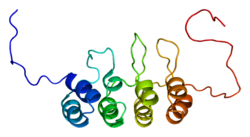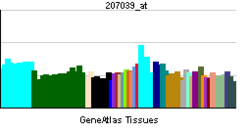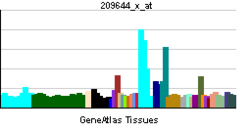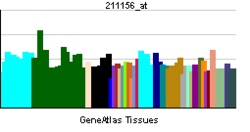CDKN2A
بازدارندهٔ کیناز 2A وابسته به سایکلین (انگلیسی: cyclin-dependent kinase inhibitor 2A) یک ژن است که بر روی بازوی کوتاه کروموزوم ۹ واقع شده است[۴] که بهطور فراگیر در بسیاری از بافتها و انواع سلول بیان میشود.[۵] این ژن دو پروتئین مهم را کُدگذاری میکند: پی۱۶ و پی۱۴آرف.[۶] هر دوی این پروتئینها ژن سرکوبگر تومور و این کار را از طریق تنظیم چرخه سلول انجام میدهند. پی۱۶ آنزیمهای CDK4 و CDK6 را مهار و در نتیجه پروتئینهای خانوادهٔ پروتئین رتینوبلاستوما را فعال میکند که آنهم به نوبهٔ خود مسیر عبور از فاز G1 به فاز S را مسدود میکند. پی۱۴آرف ژن سرکوبگر تومور پی۵۳ را فعال میکند.
اهمیت بالینی
[ویرایش]جهشهای سوماتیک این ژن در بسیاری از سرطانهای انسانی از جمله لنفوم معده،[۷] لنفوم بورکیت،[۸] کارسینومهای سلول سنگفرشی در سرطانهای سر و گردن،[۹] سرطان دهان،[۱۰] سرطان لوزالمعده،[۱۱] سرطان ریه از نوع غیر سلول کوچک،[۱۲] سرطان مری سنگفرشی،[۱۳] سرطان معده،[۱۴] سرطان روده بزرگ،[۱۵] سرطان اپیتلیومی تخمدان[۱۶] و سرطان پروستات[۱۷] شایع است و گمان میرود CDKN2A دومین ژن غیرفعالشده در سرطان بعد از پی۵۳ است. جهشهای این ژن در سلولهای زایا با بروز ملانوما، گلیوبلاستوما و سرطان لوزالمعده مرتبط است.[۱۸] این ژن همچنین حاوی یکی از ۲۷ چندریختی تکنوکلئوتید مرتبط با بیماری سرخرگ کرونری است[۱۹] و با پیشرفت تصلب شرایین در ارتباط است.[۲۰]
حذف این ژن یکی از شایعترین مکانهای حذف ژنی است که منجر به بروز انواع ارثی ملانوم بدخیم پوستی میشود.[۲۱][۲۲][۲۳][۲۴][۲۵]
علاوه بر این، فعال شدن این ژن در جریان پیرشدگی سلول افزایش مییابد و از این لحاظ یک زیستنشانگر پیر شدن فیزیولوژیک است.[۲۶]
پانویسها
[ویرایش]- ↑ ۱٫۰ ۱٫۱ ۱٫۲ GRCm38: Ensembl release 89: ENSMUSG00000044303 - Ensembl, May 2017
- ↑ "Human PubMed Reference:". National Center for Biotechnology Information, U.S. National Library of Medicine.
- ↑ "Mouse PubMed Reference:". National Center for Biotechnology Information, U.S. National Library of Medicine.
- ↑ "CDKN2A". Genetics Home Reference. National Library of Medicine. January 2015. Retrieved April 14, 2015.
- ↑ "BioGPS - your Gene Portal System". biogps.org. Retrieved 2016-10-11.
- ↑ "Cyclin-Dependent Kinase Inhibitor 2A". GeneCards. Weizmann Institute of Science. Retrieved April 14, 2015.
- ↑ Huang Q, Su X, Ai L, Li M, Fan CY, Weiss LM (October 2007). "Promoter hypermethylation of multiple genes in gastric lymphoma". Leukemia & Lymphoma. 48 (10): 1988–96. doi:10.1080/10428190701573224. PMID 17852707. S2CID 72186314.
- ↑ Robaina MC, Faccion RS, Arruda VO, de Rezende LM, Vasconcelos GM, Apa AG, Bacchi CE, Klumb CE (February 2015). "Quantitative analysis of CDKN2A methylation, mRNA, and p16(INK4a) protein expression in children and adolescents with Burkitt lymphoma: biological and clinical implications". Leukemia Research. 39 (2): 248–56. doi:10.1016/j.leukres.2014.11.023. PMID 25542698.
- ↑ El-Naggar AK, Lai S, Clayman G, Lee JK, Luna MA, Goepfert H, Batsakis JG (December 1997). "Methylation, a major mechanism of p16/CDKN2 gene inactivation in head and neck squamous carcinoma". The American Journal of Pathology. 151 (6): 1767–74. PMC 1858347. PMID 9403727.
- ↑ Asokan GS, Jeelani S, Gnanasundaram N (October 2014). "Promoter hypermethylation profile of tumour suppressor genes in oral leukoplakia and oral squamous cell carcinoma". Journal of Clinical and Diagnostic Research. 8 (10): ZC09-12. doi:10.7860/JCDR/2014/9251.4949. PMC 4253256. PMID 25478438.
- ↑ Jiao L, Zhu J, Hassan MM, Evans DB, Abbruzzese JL, Li D (January 2007). "K-ras mutation and p16 and preproenkephalin promoter hypermethylation in plasma DNA of pancreatic cancer patients: in relation to cigarette smoking". Pancreas. 34 (1): 55–62. doi:10.1097/01.mpa.0000246665.68869.d4. PMC 1905887. PMID 17198183.
- ↑ Marchetti A, Buttitta F, Pellegrini S, Bertacca G, Chella A, Carnicelli V, Tognoni V, Filardo A, Angeletti CA, Bevilacqua G (February 1997). "Alterations of P16 (MTS1) in node-positive non-small cell lung carcinomas". The Journal of Pathology. 181 (2): 178–82. doi:10.1002/(SICI)1096-9896(199702)181:2<178::AID-PATH741>3.0.CO;2-5. PMID 9120722. S2CID 20155703.
- ↑ Qureshi MA, Jan N, Dar NA, Hussain M, Andrabi KI (September 2012). "A novel p16(INK4A) mutation associated with esophageal squamous cell carcinoma in a high risk population". Biomarkers. 17 (6): 552–6. doi:10.3109/1354750X.2012.699556. PMID 22724384. S2CID 19678492.
- ↑ He D, Zhang YW, Zhang NN, Zhou L, Chen JN, Jiang Y, Shao CK (April 2015). "Aberrant gene promoter methylation of p16, FHIT, CRBP1, WWOX, and DLC-1 in Epstein-Barr virus-associated gastric carcinomas". Medical Oncology. 32 (4): 92. doi:10.1007/s12032-015-0525-y. PMID 25720522. S2CID 38800637.
- ↑ Rajendran P, Dashwood WM, Li L, Kang Y, Kim E, Johnson G, Fischer KA, Löhr CV, Williams DE, Ho E, Yamamoto M, Lieberman DA, Dashwood RH (2015-01-01). "Nrf2 status affects tumor growth, HDAC3 gene promoter associations, and the response to sulforaphane in the colon". Clinical Epigenetics. 7 (1): 102. doi:10.1186/s13148-015-0132-y. PMC 4575421. PMID 26388957.
- ↑ Bhagat R, Kumar SS, Vaderhobli S, Premalata CS, Pallavi VR, Ramesh G, Krishnamoorthy L (September 2014). "Epigenetic alteration of p16 and retinoic acid receptor beta genes in the development of epithelial ovarian carcinoma". Tumour Biology. 35 (9): 9069–78. doi:10.1007/s13277-014-2136-1. PMID 24913706. S2CID 1766337.
- ↑ Ameri A, Alidoosti A, Hosseini SY, Parvin M, Emranpour MH, Taslimi F, Salehi E, Fadavip P (December 2011). "Prognostic Value of Promoter Hypermethylation of Retinoic Acid Receptor Beta (RARB) and CDKN2 (p16/MTS1) in Prostate Cancer". Chinese Journal of Cancer Research = Chung-Kuo Yen Cheng Yen Chiu. 23 (4): 306–11. doi:10.1007/s11670-011-0306-x. PMC 3551302. PMID 23358881.
- ↑ "Genetics of Skin Cancer". National Cancer Institute. 2009-07-29. Retrieved April 14, 2015.
- ↑ Mega JL, Stitziel NO, Smith JG, Chasman DI, Caulfield M, Devlin JJ, Nordio F, Hyde C, Cannon CP, Sacks F, Poulter N, Sever P, Ridker PM, Braunwald E, Melander O, Kathiresan S, Sabatine MS (June 2015). "Genetic risk, coronary heart disease events, and the clinical benefit of statin therapy: an analysis of primary and secondary prevention trials". Lancet. 385 (9984): 2264–2271. doi:10.1016/S0140-6736(14)61730-X. PMC 4608367. PMID 25748612.
- ↑ Ye S, Willeit J, Kronenberg F, Xu Q, Kiechl S (July 2008). "Association of genetic variation on chromosome 9p21 with susceptibility and progression of atherosclerosis: a population-based, prospective study". Journal of the American College of Cardiology. 52 (5): 378–84. doi:10.1016/j.jacc.2007.11.087. PMID 18652946.
- ↑ Aoude LG, Wadt KA, Pritchard AL, Hayward NK (March 2015). "Genetics of familial melanoma: 20 years after CDKN2A". Pigment Cell & Melanoma Research. 28 (2): 148–60. doi:10.1111/pcmr.12333. PMID 25431349. S2CID 5341669.
- ↑ Hayward NK (May 2003). "Genetics of melanoma predisposition". Oncogene. 22 (20): 3053–62. doi:10.1038/sj.onc.1206445. PMID 12789280. S2CID 20268281.
- ↑ Tsao H, Niendorf K (November 2004). "Genetic testing in hereditary melanoma". Journal of the American Academy of Dermatology. 51 (5): 803–8. doi:10.1016/j.jaad.2004.04.045. PMID 15523363.
- ↑ Kefford R, Bishop JN, Tucker M, Bressac-de Paillerets B, Bianchi-Scarrá G, Bergman W, Goldstein A, Puig S, Mackie R, Elder D, Hansson J, Hayward N, Hogg D, Olsson H (November 2002). "Genetic testing for melanoma". The Lancet. Oncology. 3 (11): 653–4. doi:10.1016/s1470-2045(02)00894-x. PMID 12424065.
- ↑ Bishop DT, Demenais F, Goldstein AM, Bergman W, Bishop JN, Bressac-de Paillerets B, Chompret A, Ghiorzo P, Gruis N, Hansson J, Harland M, Hayward N, Holland EA, Mann GJ, Mantelli M, Nancarrow D, Platz A, Tucker MA (June 2002). "Geographical variation in the penetrance of CDKN2A mutations for melanoma". Journal of the National Cancer Institute. 94 (12): 894–903. doi:10.1093/jnci/94.12.894. PMID 12072543.
- ↑ Krishnamurthy J, Torrice C, Ramsey MR, Kovalev GI, Al-Regaiey K, Su L, Sharpless NE (November 2004). "Ink4a/Arf expression is a biomarker of aging". The Journal of Clinical Investigation. 114 (9): 1299–307. doi:10.1172/JCI22475. PMC 524230. PMID 15520862.
منابع
[ویرایش]- Irvine M, Philipsz S, Frausto M, Mijatov B, Gallagher SJ, Fung C, Becker TM, Kefford RF, Rizos H (February 2010). "Amino terminal hydrophobic import signals target the p14(ARF) tumor suppressor to the mitochondria". Cell Cycle. 9 (4): 829–39. doi:10.4161/cc.9.4.10785. PMID 20107316.
پیوند به بیرون
[ویرایش]- مکان ژنوم CDKN2A انسانی و صفحهٔ جزئیات ژنی CDKN2A در سامانه جستجوی بانک ژنی دانشگاه کالیفرنیا، سانتا کروز.






